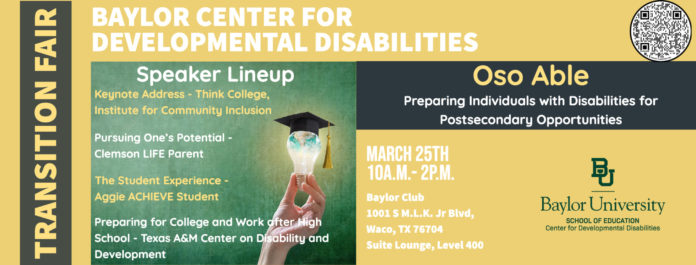
By Jenna Fitzgerald | Copy Editor
In an effort to prepare young adults with developmental disabilities for post-secondary opportunities, the Baylor Center for Developmental Disabilities (BCDD) is hosting the OSO ABLE Transition Fair from 10 a.m. to 2 p.m. on Friday at the Baylor Club.
The event will begin with a conference featuring several guest speakers, including a keynote address by representatives of Think College at the Institute for Community Inclusion. Afterward, there will be lunch and a program resource fair.
Waco doctoral candidate Kristina McGinnis said the BCDD invited service providers, young adults with developmental disabilities and their caregivers to register for OSO ABLE. She said Baylor stakeholders will also be in attendance, giving them a chance to start the conversation about establishing a transition program at Baylor.
“We’ve already had an overwhelming, great response from this event,” McGinnis said. “We have over 200 people signed up for it, which is way higher than what we were even hoping for. So we really hope that we can reach those individuals with developmental disabilities and their parents and show them that there are a lot of really great opportunities for them. We also hope that Baylor stakeholders learn more about this opportunity and maybe become invested in starting a program here at Baylor.”
Lott doctoral candidate Julie Hrabal said the transition from high school to adulthood is one that is often neglected for those with developmental disabilities. She said the unemployment rate for that population is high due to a lack of skills that they are “absolutely capable of acquiring,” which is why highlighting post-secondary opportunities is so important.
“[After high school], they still have autism,” Hrabal said. “They still have Down syndrome. They still have a need for learning these vocational skills so that they can have that independence in their adult life. It’s so, I’ll say it, underserved — almost as if it’s swept under the rug.”
Dr. Kristen Padilla, director of the BCDD, said the transition is often filled with questions and challenges not only for those with developmental disabilities but also for their caregivers. As a result, she said the goal of OSO ABLE is to foster hope by offering comprehensive information about future options.
“When you’re a parent or a teacher of an individual with a disability, it comes with discouragement sometimes,” Padilla said. “You get discouraged about what’s going to happen after they leave — ‘What can I do? How can I better prepare them? Are they going to be accepted? Will they be hired? Are they going to live with me?’ There are so many concerns that happen, and what I really hope is that it inspires them, it instills hope and it gives them the information and resources they need to start making plans.”
Padilla said OSO ABLE is highlighting two main opportunities for those with developmental disabilities: receiving job training and having a specialized college experience through transition programs like Next Steps at Vanderbilt, ClemsonLIFE and Aggie ACHIEVE.
“When you walk into high schools, you see Texas A&M, Baylor University, University of Texas,” Padilla said. “And it’d be great for our population to see Vanderbilt Next Steps, ClemsonLIFE, Aggie ACHIEVE — to say, ‘This is an opportunity for me to get a similar experience but also focus on coursework and training and employment opportunities that’ll help me be an independent adult.’”
Padilla said Dr. Shanna Hagan-Burke, dean of Baylor’s School of Education, was the head of the department of educational psychology at Texas A&M when Aggie ACHIEVE was developed. She said the two have been working together to establish a comparable transition program at Baylor.
“In my mind, I’ve been working on this in my brain for the last couple years,” Padilla said. “I’ve attended conferences. I’ve met with directors from different programs just to learn about how they started, what staffing they have, what types of courses they are providing. So there’s a lot that goes into this development, and we want to make it one of the best in Texas, if not the nation, especially in how we’re going to integrate this faith-based component here.”
Padilla said the growth in the number of these transition programs is noteworthy, as is the generosity and collaborative effort of program directors in expanding their reach.
“Every director I’ve spoken to, they’re like, ‘Just tell me what you need, and I’ll help,’” Padilla said.“Everyone is just so excited that other universities are developing these programs … When I first started looking into this, there were probably about 250 programs, and now there’s over 300, within the last couple years. So it’s only going to continue to grow, and the people that are developing these programs are just so generous. Because they just really want to build up this population.”
Padilla said she hopes events like OSO ABLE help the Baylor community and beyond realize just how much those with disabilities have to offer.
“We are all a community, whether we’re brilliant in one area and struggle in a different area,” Padilla said. “We all have gifts to share. We all have talents to share. We all have skills — they’re just at different levels. So what I hope is that it increases acceptance, diversity and awareness … We focus on ability, not disability, and that’s why we wanted to name it OSO ABLE. They are able to do a lot of things, and we just need to shine light on those skills and build up those strengths to compensate for their struggles and deficits, because they’re just like us.”





